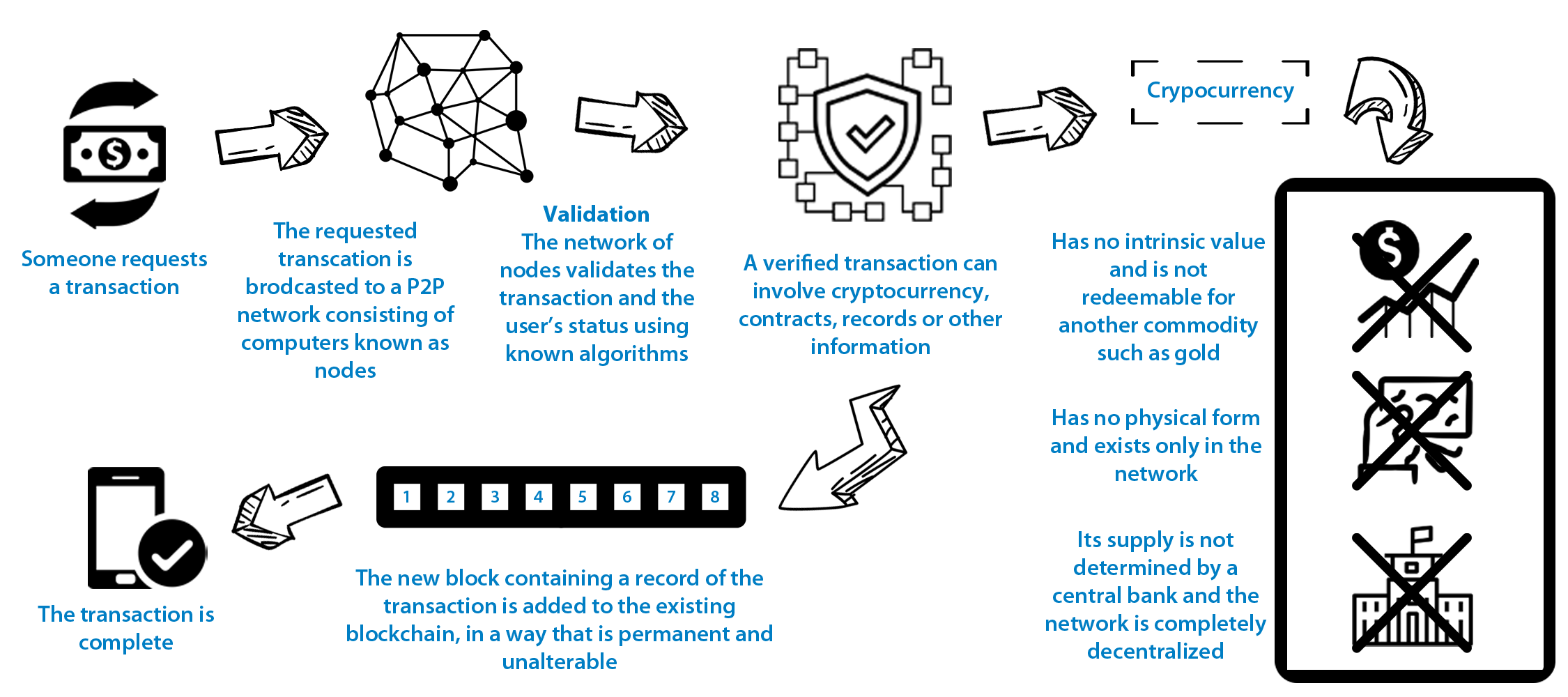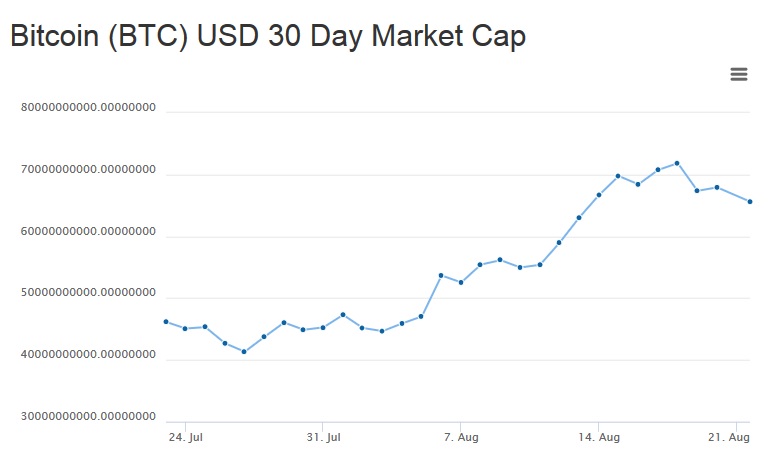The rise of Bitcoin, Ether (Ethereum) and other cryptocurrencies present fledgling companies an additional option for financing. While the popularity of these blockchain-enabled currencies is on the rise, it’s important to understand that the cryptocurrency environment is changing and evolving daily. The regulatory environment is uncertain and subject to change as governments and regulatory bodies decide how to handle digital currencies.
This article presents entrepreneurs and startups with a basic overview of blockchain, cryptocurrencies and their potential for funding early stage technology companies. For companies seriously considering digital currencies as a funding option, it’s critical to stay on top of developments in this sector as they unfold.

Blockchain is the enabling technology for secure cryptocurrencies
Blockchain is the underlying platform technology on which currencies such as Bitcoin and Ether are built. This technology not only enables the creation of cryptocurrencies, but also other applications such as smart contracts (to be expanded on later).
Conceptually, blockchain is a continuously growing ledger of all transactions that have been processed through the network. In other words, it’s a database for transactional information. We can use a Bitcoin transaction as an example. When users request a transaction, the request is sent to a decentralized, public peer to peer network of computers which validates the request using specific algorithms. Once validated, the transaction is recorded permanently and publicly in a ‘block’ of data consisting of many other transactions. This is the permanent ledger of all transactions to date, stored chronologically. All sequential blocks of data are what make up the blockchain. All transactions ever made are permanent, visible and traceable. Since the data is public and distributed across many computers (there are thousands of copies of this ledger), it’s transparent and extremely difficult to alter or corrupt since there’s no single point of failure which could be exploited.
All computers (nodes) in this decentralized network are continuously comparing, validating and verifying the blockchain to ensure it remains unaltered. The security of cryptocurrencies is dependent on ‘miners’ – the individual computers or nodes in the network which add transactions to the blockchain and verify that the past transactions haven’t changed and that currency is not double-spent. Any individual can become part of this network. As a reward for the heavy computation required for this process, ‘miners’ are rewarded or paid with digital currency (such as Bitcoin, Ether etc.) when they validate these blocks of data.
Cryptocurrencies – risk and regulation
Currently, there are hundreds of cryptocurrencies in existence, but Bitcoin and Ethereum are leading the way with market capitalizations of $66B and $31B as of August 2017. Bitcoin has increased nearly 75% in value in the last 30 days (see figure below). The extreme volatility makes owning these currencies quite risky but also presents a great opportunity for high returns.
The impact of government legislation or restriction could have significant positive or negative consequences. Japan approved Bitcoin as a legal method of payment (but not as a true currency) earlier this year, despite turbulent events such as the spectacular failure and controversy surrounding Mt. Gox bitcoin exchange in 2014. The massive loss of Bitcoin that resulted was caused by corporate mismanagement and poor business practices rather than a fault of the technology itself. In the US, getting laws passed in each state individually continues to be an uphill battle. However, progress is being made as the US Commodity Futures Trading Commission has granted approval in July 2017 to a cryptocurrency trading company to become the first federally regulated digital currency exchange. Estonia is even considering creating their own cryptocurrency, which would be the first ICO for a nation.

Crowdfunding and Initial Coin Offerings
Initial coin offerings (ICOs) are a new, somewhat controversial way of raising funding for new ideas (often pre-product stage). The appetite for investing in ICO companies is exploding. As of August 2017, approximately $1.3B has been raised through ICOs compared with just $300M in all prior years combined.
A company will offer crypto-tokens in exchange for investment in the form of digital currency. Investors who own tokens will get bits of equity in the company as well as the ability to exchange or trade tokens for digital currency like Ether or Bitcoin. Tokens are commodity items which have a value and can represent things like shares in a company, goods, or currency. Tokens can also be used to access the eventual product / service for which they were issued. When the company who issued the tokens builds a successful technology, the demand for the issued tokens rises and the investor can earn a return.
The term ‘coin’ and ‘token’ are sometimes used interchangeably. Tokens differ from coin in that they are hosted on another cryptocurrency’s blockchain while coin has its own blockchain. The Ethereum blockchain is used most often for ICOs because it’s relatively easy to issue and trade the tokens using smart contract functionality, which Ethereum is known for. Ethereum blockchain can be thought of as a token-generating machine. For visualization, a token is to Ether what a movie ticket is to the Canadian Dollar.
Smart contracts are pieces of computer code which can automatically perform specific tasks such as issuing tokens or currency under a certain set of conditions or agreements. For example, a bond would be able to automatically pay out the bond holder without any third parties or paperwork. Unlike Bitcoin, Ethereum has its own programming language that allows this functionality. The contracts are executed automatically without third party intervention and recorded in the blockchain by the distributed computers in the network (miners).
Controversy and regulation
Despite the recent red-hot ICO frenzy, the sentiment on this form of investment is mixed. There have been many cases of multi-million dollar raises for pre-product or ideation-stage companies where the companies have failed to deliver on their promises, costing investors millions. The DAO raised $150M by issuing DAO tokens only to fail shortly thereafter following a hack attack. This has led to the proposal of best practices concerning ICO funding. Legislation and regulation of ICOs and tokens is largely absent and tends to brush up against securities regulation. There’s a lot of speculation and ambiguity about the direction regulators will take and how this will impact the hot ICO market.
Examples of ICO-funded companies
Recently, a startup called Brave raised $35M in about 30 seconds with an ICO where they issued Basic Attention tokens based on Ethereum. Brave is a new web browser that would allow users to send micro payments in cryptocurrency to web publishers based on how many articles they read. Records are being smashed month over month. In July 2017, Tezos raised $232M in 13 days for their brand new and improved blockchain (still at the alpha testing stage). In June, Bancor issued BNT or Bancor Network Tokens in the second largest ICO to date, raising $150M. Bancor is a protocol that allows buying and selling of smart tokens through their smart contracts directly rather than on a typical exchange where individuals set bid and ask prices. This improves liquidity and controls price based entirely on algorithms.
Golem is another example of an ICO-funded company (Golem Network Token or GNT) who offers distributed super computing services on the cloud to make use of idle computing power. They raised just under $10M in their ICO in August 2016 and are now valued at $232M market cap after peaking at $600M only a couple months ago – talk about volatility!
The above are just a couple examples of the hundreds of types of tokens available, created through company ICOs.

Tips for startups
Regardless if you’re thinking about raising funds through ICO or not, cryptocurrencies shouldn’t be ignored. The pace at which they are evolving, the hype and the billions of dollars changing hands daily is a testament to their potential. Whether digital currency will eventually be recognized as an official currency in the global economy remains to be seen. Regulatory and legal risk is high, but there’s always risk in early adoption of any technology.
Beyond cryptocurrencies, blockchain technology has the potential to transform business in many ways by allowing near corruption-proof record keeping, transactions and databases. Keep a close eye on this emerging industry over the coming months and years.




